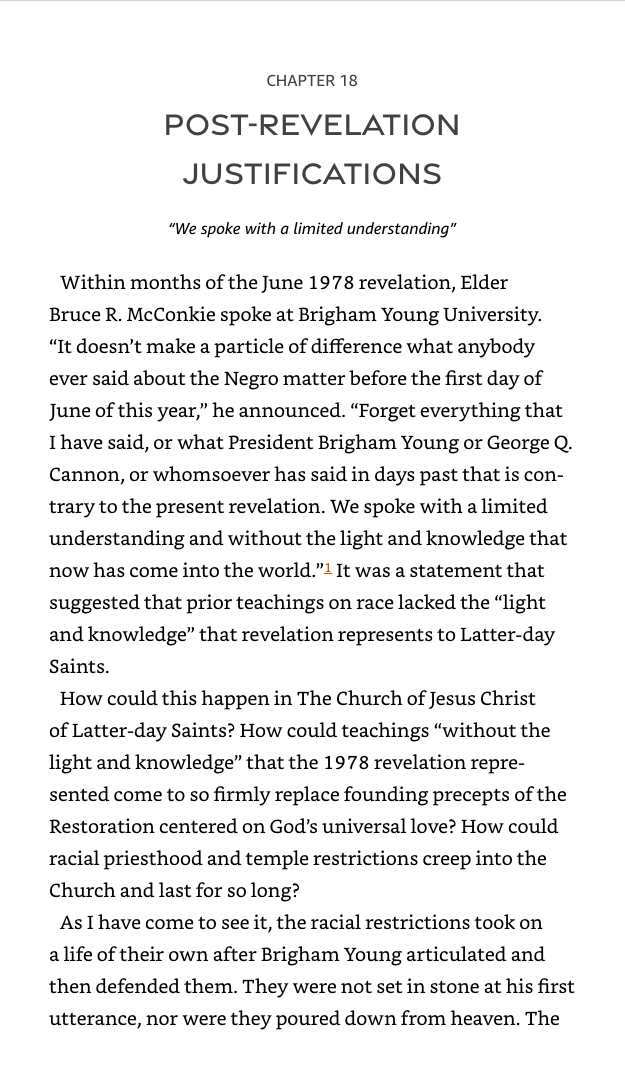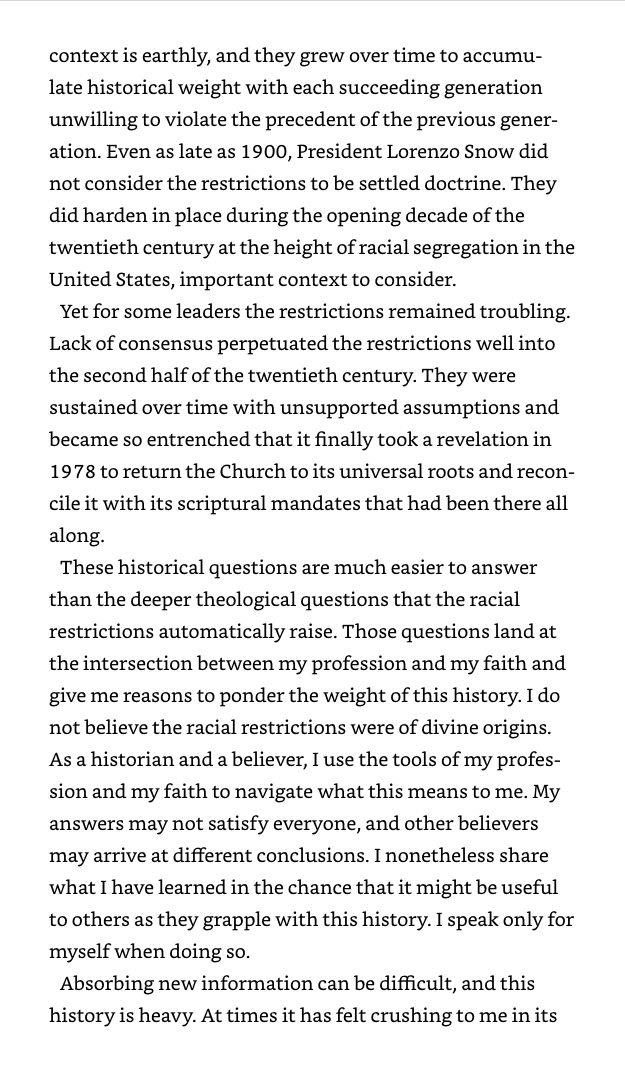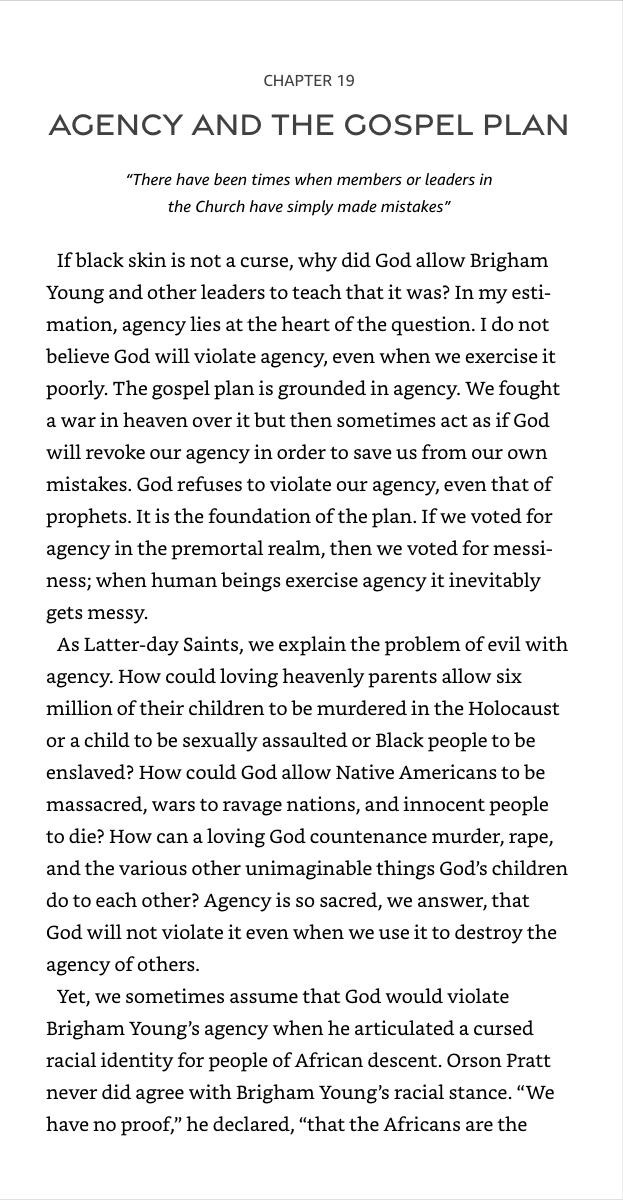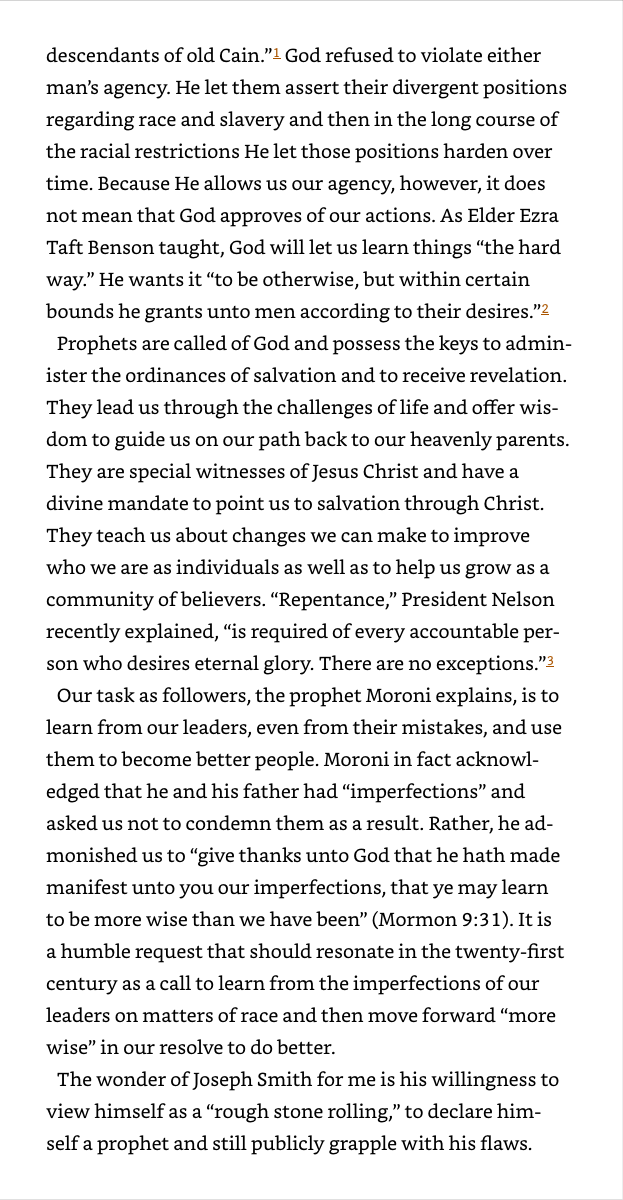Historian W. Paul Reeve states that the priesthood restriction was not inspired and was a mistake.
- Type
- Book
- Source
- W. Paul Reeve LDS
- Hearsay
- Direct
- Reference
W. Paul Reeve, Let’s Talk about Race and Priesthood (Salt Lake City, UT: Deseret Book, 2023), Kindle Edition.
- Scribe/Publisher
- Deseret Book
- People
- W. Paul Reeve
- Audience
- General Public
- Transcription
Chapter 18
POST-REVELATION JUSTIFICATIONS
“We spoke with a limited understanding”
Within months of the June 1978 revelation, Elder Bruce R. McConkie spoke at Brigham Young University. “It doesn’t make a particle of difference what anybody ever said about the Negro matter before the first day of June of this year,” he announced. “Forget everything that I have said, or what President Brigham Young or George Q. Cannon, or whomsoever has said in days past that is contrary to the present revelation. We spoke with a limited understanding and without the light and knowledge that now has come into the world.” It was a statement that suggested that prior teachings on race lacked the “light and knowledge” that revelation represents to Latter-day Saints.
How could this happen in The Church of Jesus Christ of Latter-day Saints? How could teachings “without the light and knowledge” that the 1978 revelation represented come to so firmly replace founding precepts of the Restoration centered on God’s universal love? How could racial priesthood and temple restrictions creep into the Church and last for so long?
As I have come to see it, the racial restrictions took on a life of their own after Brigham Young articulated and then defended them. They were not set in stone at his first utterance, nor were they poured down from heaven. The context is earthly, and they grew over time to accumulate historical weight with each succeeding generation unwilling to violate the precedent of the previous generation. Even as late as 1900, President Lorenzo Snow did not consider the restrictions to be settled doctrine. They did harden in place during the opening decade of the twentieth century at the height of racial segregation in the United States, important context to consider.
Yet for some leaders the restrictions remained troubling. Lack of consensus perpetuated the restrictions well into the second half of the twentieth century. They were sustained over time with unsupported assumptions and became so entrenched that it finally took a revelation in 1978 to return the Church to its universal roots and reconcile it with its scriptural mandates that had been there all along.
These historical questions are much easier to answer than the deeper theological questions that the racial restrictions automatically raise. Those questions land at the intersection between my profession and my faith and give me reasons to ponder the weight of this history. I do not believe the racial restrictions were of divine origins. As a historian and a believer, I use the tools of my profession and my faith to navigate what this means to me. My answers may not satisfy everyone, and other believers may arrive at different conclusions. I nonetheless share what I have learned in the chance that it might be useful to others as they grapple with this history. I speak only for myself when doing so.
. . .
Chapter 19
AGENCY AND THE GOSPEL PLAN
“There have been times when members or leaders in the Church have simply made mistakes”
If black skin is not a curse, why did God allow Brigham Young and other leaders to teach that it was? In my estimation, agency lies at the heart of the question. I do not believe God will violate agency, even when we exercise it poorly. The gospel plan is grounded in agency. We fought a war in heaven over it but then sometimes act as if God will revoke our agency in order to save us from our own mistakes. God refuses to violate our agency, even that of prophets. It is the foundation of the plan. If we voted for agency in the premortal realm, then we voted for messiness; when human beings exercise agency it inevitably gets messy.
As Latter-day Saints, we explain the problem of evil with agency. How could loving heavenly parents allow six million of their children to be murdered in the Holocaust or a child to be sexually assaulted or Black people to be enslaved? How could God allow Native Americans to be massacred, wars to ravage nations, and innocent people to die? How can a loving God countenance murder, rape, and the various other unimaginable things God’s children do to each other? Agency is so sacred, we answer, that God will not violate it even when we use it to destroy the agency of others.
Yet, we sometimes assume that God would violate Brigham Young’s agency when he articulated a cursed racial identity for people of African descent. Orson Pratt never did agree with Brigham Young’s racial stance. “We have no proof,” he declared, “that the Africans are the descendants of old Cain.” God refused to violate either man’s agency. He let them assert their divergent positions regarding race and slavery and then in the long course of the racial restrictions He let those positions harden over time. Because He allows us our agency, however, it does not mean that God approves of our actions. As Elder Ezra Taft Benson taught, God will let us learn things “the hard way.” He wants it “to be otherwise, but within certain bounds he grants unto men according to their desires.”
Prophets are called of God and possess the keys to administer the ordinances of salvation and to receive revelation. They lead us through the challenges of life and offer wisdom to guide us on our path back to our heavenly parents. They are special witnesses of Jesus Christ and have a divine mandate to point us to salvation through Christ. They teach us about changes we can make to improve who we are as individuals as well as to help us grow as a community of believers. “Repentance,” President Nelson recently explained, “is required of every accountable person who desires eternal glory. There are no exceptions.”
The B. H. Roberts Foundation is not owned by, operated by, or affiliated with the Church of Jesus Christ of Latter-day Saints.




